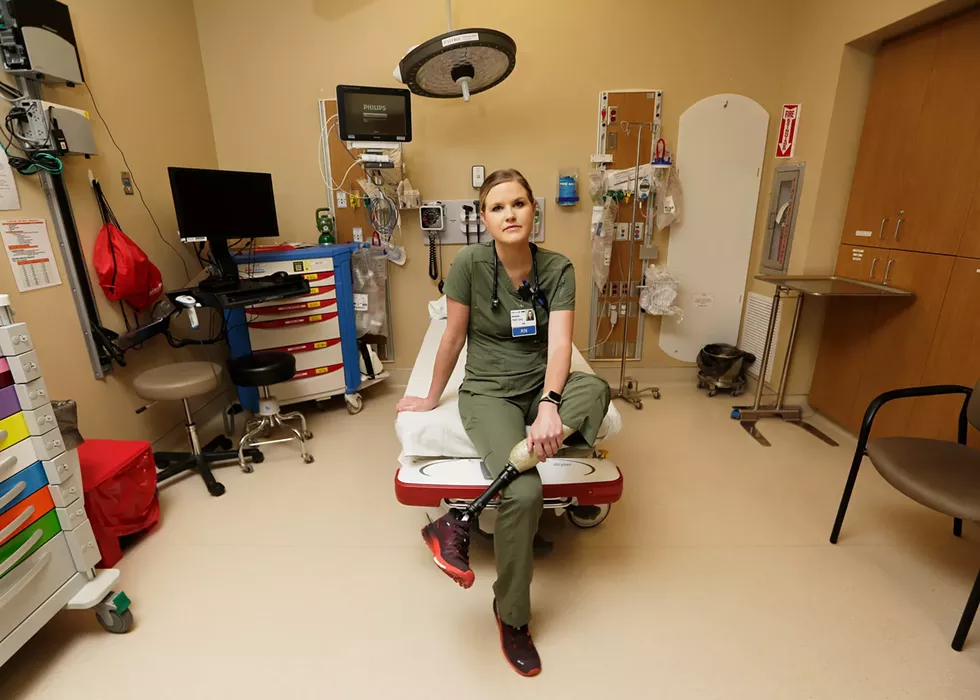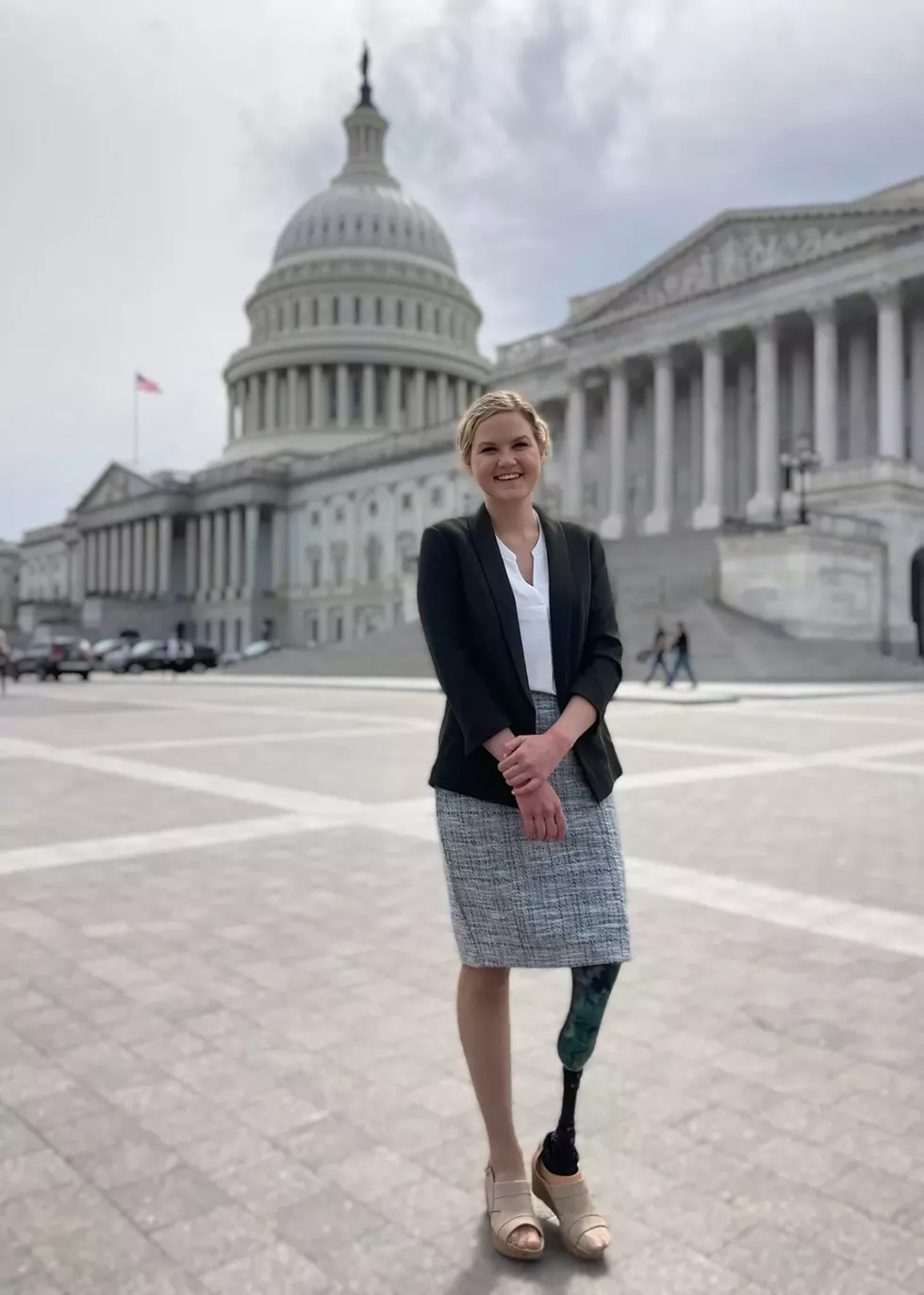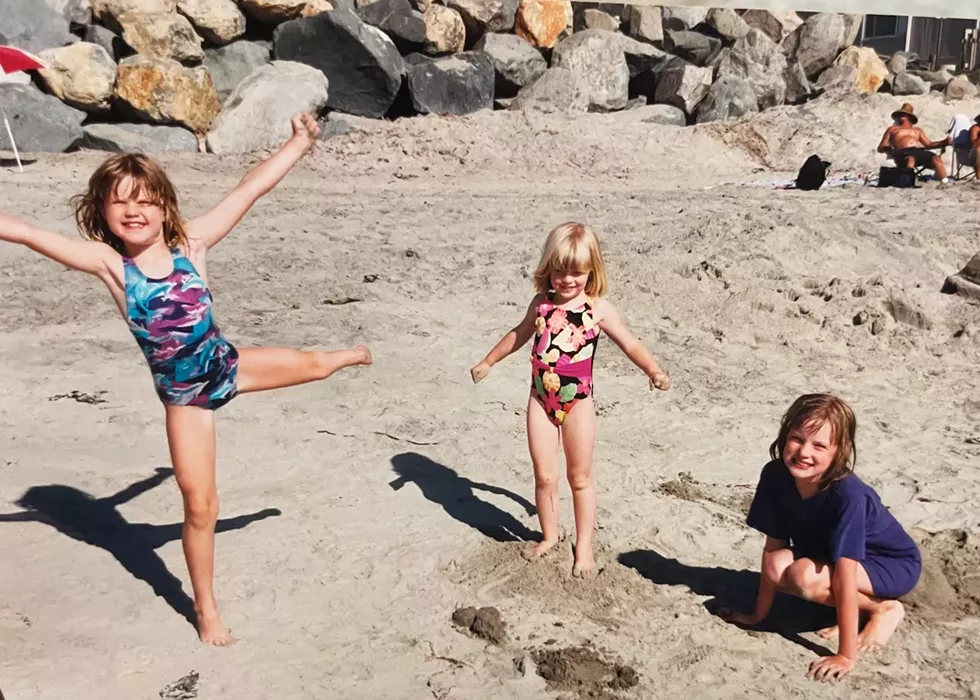
Most days, Hannah Cvancara has no time to wait.
When Multicare Deaconess North Emergency Center in Spokane is full, the nurse dashes from one life-or-death decision to another. Trauma wounds. Heart attacks. Mental health episodes. It's an adrenaline junkie's dream. And Cvancara — rock climber, snowboarder and international backpacker — is definitely an adrenaline junkie.
But on an early summer weekday afternoon, the ER is almost empty. Cvancara checks on her only patient, then sits behind a computer and waits. If she's bored, she hides it well, teasing coworkers while updating digitized medical records.
Despite a life spent thinking on her feet, Cvancara is uncommonly patient. For one of the biggest decisions in her life, the 28-year-old has been forced to wait. And wait. And wait.
The daughter of an Air Force medic, Cvancara has waited almost her entire life to join the military as a nurse.
"I've known I've wanted to serve since middle school," Cvancara says. "That has never gone away."
But she's been repeatedly denied because of her missing left foot, which was amputated when she was an infant due to fibular hemimelia, a random congenital birth defect where children are born with a missing or shortened fibula in their lower leg.
Even though she's used a prosthetic since her first step, the Department of Defense's Medical Standards for Military Service excludes her from joining the armed forces. It's not just her — the instructions prevent any person with a missing limb from enlisting.
That is, if you lose a limb as a civilian, you're not allowed in. But if you're an active military member and you lose a limb, you can continue to serve as long as you can still pass the basic physical requirements.
Cvancara can easily pass the required military fitness tests. She wants to do exactly the same job she's doing now, just in a military hospital. She fits in seamlessly in the high-stress ER, where she says her coworkers have no idea she has a prosthetic leg unless she brings it up.
Still, the military considers her unfit to enlist.
Instead of accepting their answer, Cvancara has decided to take on one of the largest bureaucracies in the world, one painfully slow email at a time.
Working with her local congresswoman, U.S. Rep. Cathy McMorris Rodgers, Cvancara helped introduce the Hannah Cvancara Service Act, which would amend the Department of Defense Instructions — the rules that dictate who can join. The bill would allow people with missing limbs to join the military as medical personnel as long as they can fulfill all other requirements.

"The military wants you to be reliable and deployable — that's the goal, which I totally get and respect," Cvancara says. "That's what makes this issue kind of tense. You don't want to weaken the standards in any way. You want a strong force. However, you also don't want to say no to someone who is capable without giving them the chance."
The Hannah Cvancara Service Act was first introduced in 2022, passing the House as part of a larger military spending package, but getting removed before the final package passed in the Senate. McMorris Rodgers reintroduced the bill in the House this year.
This time, the legislation comes after two of the worst years for military recruitment since the Vietnam War. With the added support of a new co-sponsor from Tennessee, McMorris Rodgers hopes to attach the Hannah Cvancara Service Act to the National Defense Authorization Act for the 2025 fiscal year.
The military does have a waiver system — if an applicant fails one or more of the medical standards, waivers are generated and sent to that branch's surgeon general. It's up to that surgeon general to decide if they want to let the applicant join or not. Depending on the branch of the military and the condition in question, approval rates can range from less than 10% to more than 80%.
But so far, no pre-service amputee has ever been waived in.
Cvancara hopes to be the first, and is applying to serve in the Air National Guard. But she doesn't just want a waiver — she wants federal legislation to make sure someone else like her doesn't have to face the same uphill battle.
For now, Cvancara and her supporters are left waiting, first to hear the results of committee discussions this summer, then, hopefully, for the House vote later this year. Then, the bill still would have to pass the Senate.
Meanwhile, Cvancara is waiting to hear whether her own Air National Guard application will be accepted, a decision she's already spent a year waiting for.
DON'T RUN FROM REALITY
When Cvancara was born, she was completely healthy except for a missing fibula, a long, thin bone between the knee and ankle."There's no reason for it," Cvancara says. "My mom had a healthy pregnancy, and it's very random."
Cvancara did have a tiny left foot with four toes. The doctors didn't want to amputate, "but I'm so glad they did," she says, "because that foot would have been a little toothpick and that bone would have been so weak."
Instead, Cvancara took her first steps with a strong, fully functional prosthetic. She grew up an athlete, playing volleyball, backpacking, swimming, snowboarding and rock climbing with her family without any issues.
When they weren't outdoors, the Cvancaras were visiting war museums or watching Vietnam documentaries. Her father, Air Force flight surgeon Lt. Col. Joseph Cvancara, instilled in his four daughters the importance of service and patriotism.
"He was just really good at [saying,] 'Don't escape reality,'" Cvancara says. "My dad made sure our eyes were opened to not taking our freedom for granted."
Cvancara was crowned Miss Spokane in 2013, her senior year of high school. For the year of her reign, she created a community service project called "Honoring Their Sacrifice: Recognizing and Supporting our Disabled Veterans." It nodded to a commitment she had been hoping to make since adolescence.
After completing college prerequisites in Washington state, Cvancara headed down to National University in San Diego in 2017 to get an accelerated Bachelor of Science in Nursing. She did clinicals at the Navy Medical Center there and worked as a civilian nurse alongside Navy nurses.
The only difference between the civilian and Navy nurses was that Navy nurses might be deployed.
"But even when those nurses did deploy, it would usually be to another hospital in a different area, or on an aircraft carrier, which has a little clinic on it, or on those big white [hospital] ships," Cvancara says. "I was doing everything that the Navy nurses were doing."
After graduating, Cvancara contacted a recruiter in 2021 to join the Navy Nurse Corps. She expected some pushback, so she also decided to get in touch with McMorris Rodgers to ask if she would be willing to support her.
Then, Cvancara did something even more unusual. She took the Navy's physical readiness test before she went through the official military entrance processing station, or MEPS. Typically, applicants are not allowed to take the test until they've been medically cleared by MEPS, including having all waivers signed and approved. But for some reason, the Navy let Cvancara take the physical test first.
"I wanted to prove that I could do it," she says.
She could definitely do it. She did the swimming test twice, once with her prosthetic and once without. Both were acceptable times, but it turns out she was a few seconds faster without it. She ran 1.5 miles in 13 minutes, 29 seconds. She could do 30 push-ups and about 100 abdominal crunches in a minute each.
But after the fitness exam came more waiting. Cvancara had to wait seven months to go to the Navy MEPS. Once she finally completed the entrance process, her waivers were created and sent to the Navy surgeon general.
It took about two weeks for the Navy to get back to her.
'TWO REAL LEGS'
"Based on a review of available medical information, the subject applicant does not meet established physical standards due to left leg," the rejection letter from the Navy read."Unfortunately, a waiver of the physical standards cannot be issued," the letter continued. "The applicant does not meet physical standards for Appointment, Enlistment, and Induction as outlined in Department of Defense Instruction 6130.03, Volume I. Navy Recruiting Command expresses its appreciation to the applicant for the interest shown in the United States Navy and wishes all the best for the applicant's future endeavors."
It wasn't entirely unexpected. But the response didn't satisfy Cvancara. She still wanted a clearer reason why her prosthetic leg meant she couldn't join.
"Don't think common sense has anything to do with it," says retired Air Force Brig. Gen. Jim McDevitt, who was also previously the U.S. Attorney for the Eastern District of Washington. "We're talking about the largest bureaucracy in the country. We're talking about rules."
There might have been good reasons to exclude amputees in the past, but Cvancara thinks that medicine has progressed faster than the Department of Defense Instructions have.
"Technology is so good with prosthetics now that they are stronger than your legs," she says. "It's titanium, carbon fiber, steel. If the technology is getting better, why can't we match the standards to that? I mean, we have people in the Paralympics who run so much faster than people with two real legs."
Almost immediately after the Navy's rejection letter, Cvancara headed to Washington, D.C. with the American Orthotics and Prosthetics Association to discuss introducing a bill for amputees with McMorris Rodgers.
She's not the only one dissatisfied with the MEPS process. It's a system Joe Schuman — an officer with the Air Force Reserves and federal civilian employee with the Department of Defense — has been brainstorming ways to improve for years.
Schuman, an MIT grad, has a history of congenital scoliosis and spinal fusion surgeries. But he was also a collegiate soccer player deemed by his doctor to have "no limitations whatsoever."
Schuman was rejected for military service three times before strong personal connections helped get him accepted into the military in 2018. He's now an engineer for the military who spends most of his time behind a computer. He writes about MEPS for various niche publications focused on the armed forces.
My dad made sure our eyes were opened to not taking our freedom for granted.
"Intelligence, logistics, medical personnel — there's a lot of support functions to support the warfighter. I think that distinction is important when talking about waivers," Schuman says. "My thesis is that it's appropriate for the military to differentiate applicants based on their medical and physical abilities. But we shouldn't hold all applicants to the same standard if we're asking them to do different things."
More than 70% of 18- to 24-year-olds are considered unfit for military service because of physical fitness, a criminal record, or lack of a GED or high school diploma, McDevitt says.
Schuman adds that there's a decreasing number of applicants from top universities or with a STEM background. Some have called it a national security crisis. To address this without decreasing standards, Schuman says, applicants need to be allowed to be assessed on a more individualized basis.
"The whole point of a waiver is to evaluate whether an applicant is kind of worth the risk," he says. "A lot of my issue with the process now is that many applicants don't get to that point. They're filtered out by recruiters beforehand who just don't want to do the extra work to push them for a waiver. It's just as with many things in the military — overly bureaucratized and standardized, and there [isn't] enough room for exceptions."
IN THEIR SHOES
Six months after Cvancara was rejected from the Navy, the Hannah Cvancara Service Act was first introduced to Congress. Cvancara and McMorris Rodgers had to wait over a year to see if it would be included in the National Defense Authorization Act Fiscal Year 2024.In April 2023, Cvancara decided to try to join the Air National Guard, a branch that McDevitt and others suggested might be friendlier to her goals. Her case was assigned to Tech. Sgt. Brandon Dahl, a recruiter in Spokane Valley.
"I'm ready to help anybody that's ready to serve," Dahl says. "I try to treat all my applicants the same way I would want to be treated through the process if I were in their shoes. Anybody that comes to me, regardless of any kind of situation they may be in medically or otherwise, I'll definitely try my hardest and see what we can do to make it work."
For a typical applicant, the application process could be as quick as three weeks if everything goes perfectly, Dahl says. If not, it can last up to a year. Dahl helped Cvancara start her Air National Guard application about 14 months ago.
Meanwhile, the Hannah Cvancara Service Act did not pass with the National Defense Authorization Act for fiscal 2024.
Undeterred, Cvancara met with Col. James T. McGovern, commander of the local wing of the Air National Guard at Fairchild Air Force Base, in early 2024 to discuss her application. She was both encouraged and disappointed.
"He said, 'Hannah, our doors are open for you, but our hands are tied because the DOD makes the rules," she says.
It's up to someone on the Air Force surgeon general's team, who will never meet Cvancara, to decide to waive her in or not.
McDevitt wrote a personal endorsement letter to accompany Cvancara's Air National Guard application.
In February, Maj. Gen. Bret Daugherty, who commands the Washington Army and Air National Guard as adjutant general of the Washington Military Department, wrote back to say the decision was out of his hands.
"We are following current developments regarding the Hannah Cvancara Service Act in the House Armed Services Committee and are supportive of the intent to extend opportunities to serve to candidates with medical histories like Ms. Cvancara's," Daugherty's letter said. "In the meantime, we sincerely hope that the AFRS/SG can grant her waiver request upon further review and, should they do so, we will gladly move on to the next step of finding her an appropriate vacancy within the WA-ANG."
INSPIRING OTHERS
McMorris Rodgers reintroduced the Hannah Cvancara Service Act to Congress on Feb. 21, 2024.Meanwhile, in the town of Washington, Missouri, a sharpshooter was doing some online reading.
"I enjoy reading a lot about military history and things like that," says Sam Rudloff.
He was born in South Korea without a left hand and adopted as an infant into a Missouri family. His new grandfather was a World War II vet. As a kid, Rudloff learned to shoot a gun and developed some pretty great aim, eventually taking bronze in one of the 2021 World Shooting Para Sport Championships events.

Rudloff had dreamed of joining the military ever since he was a kid on his grandpa's lap. He played rugby in college and is a long-distance runner. He served in the Peace Corps, living in a remote part of Zambia for two years, and loved every minute of it.
But because of his missing left hand, he's been turned away by most military recruiters. Even when he found someone who believed in him, it was a long shot.
"I was working with this really great captain, and our angle was to try to get me into an administration role," he says. "She said, 'You know, this could be a two- to four-year battle for just a 'maybe.'"
He was discouraged, especially after coming back from Zambia to no good news. But he still spent plenty of free time reading military history and current events online. That's how he read about the bill's reintroduction in February.
"I saw the bill and went straight away to try to contact Hannah," Rudloff says. "I'm so grateful for Hannah to keep on just pushing for this to happen."
Cvancara's bill would only allow people with missing limbs to join the military as medical personnel. So, Rudloff started the process of getting his EMT license right away. His job trainers are satisfied, and he hasn't come across any skill he can't perform without a left hand.
"I have yet to ever fully accept that I cannot join the military," he says. "If I can't do that, I just feel like I'm a walking corpse. If the bill passed today, I would just walk over to the recruiting station right now and sign up."
NEXT STEPS
In late April, Dave Philipps, a reporter for The New York Times, published Cvancara's story on the front page of the Sunday paper. Since then, Cvancara's inbox has been filled with people offering support and asking for advice. She and Rudloff send emails of encouragement and support back and forth.For April 2024, the Army, Marines, Air National Guard and Air Force Reserves all lowered their recruitment goals by at least 1,000 people compared with April 2023. (The Army dropped its goal by 8,000 people.) Even so, the Army, Navy, Army Reserve, Navy Reserve and Air National Guard were unable to hit their goals.
In May, the Hannah Cvancara Service Act got its first cosponsor, U.S. Rep. Steve Cohen from Tennessee.
She said, 'You know, this could be a two- to four-year battle for just a 'maybe.'
Today, Cvancara is still waiting.
She's waiting for patients to rush into the emergency room so she can decide how to help them.
She's waiting for a waiver decision from the Air National Guard after she goes to MEPS at Fairchild Air Force Base in late July or early August.
She's waiting to see what decisions the American military makes in an international arena growing increasingly more tense.
"Part of the reason I even became an ER nurse is because I like being in the action," she says. "Peacetime is great, and we should all want to be in peacetime. But if things hit the fan, I would want to deploy. I'd want to be in the fight. That's where you feel the most wanted, the most needed and the most fulfilled."
Bureaucracy, federal policy and committee meetings, on the other hand, don't usually feel so fulfilling. But Cvancara knows that a slow, grinding push is the only way to produce even a tiny shift in the behemoth that is the Department of Defense.
"I try very, very, very hard not to let anything stop me," she says. "If I do want to serve, and I'm being told no, I want a reason why. The military's reason why is not good enough. That's why I'm not done." ♦
MEDICAL HISTORIES REVEALED
There are plenty of factors that make military recruiting harder, like competitive salaries for civilian jobs, low unemployment rates and COVID complications, says Master Sgt. Brittany Corr, a recruiting flight chief in Spokane Valley.But things got even harder in March 2022, when military recruitment in Washington state started using a new software called Genesis, a program for tracking medical records.
In 2017, the military started using Genesis in a few military hospitals to track service members' health records. Washington state was one of the first pilot locations. A few years later, selected recruiters started using Genesis to scrape all medical records for anyone applying for the military.
"It's a great tracking tool for medicine — all of your history is there," says Tech. Sgt. Michael Brown, director for community relations and public affairs for the 141st Air Refueling Wing. "It can make things difficult for getting people in because there is that litany of information."
"Say, for example, somebody went to urgent care for an ingrown toenail," Corr says. "That comes up [through Genesis] when they wouldn't have even thought of that coming into the recruiting office."
A severe ingrown toenail could keep you from joining the military. If it happened a long time ago and wasn't severe, a military applicant might forget to mention it in their evaluation process. But now, with electronic scraping from Genesis, the records will be pulled and a waiver will be automatically generated.
It's a felony to lie about your medical history while applying to the military. But that doesn't mean it isn't common. John F. Kennedy, who grew up with back pain and ulcers, is an oft-cited example of someone who worked his way around medical exams to join the Navy. An article in Military Times calls fudging medical records "a tacit tradition."
"We [pilots] learned to cheat on the hearing exam," says retired Air Force Brig. Gen. Jim McDevitt. "You could then. You can't now. Oftentimes, you'll learn to memorize the eye chart. You did all kinds of little clever things. Sometimes the flight surgeon knew and they would kind of look the other way. I'm not saying that's right, but that's just the way it was. If they were able to go back to my medical records when I was 8 or 9 years old, it probably would have disclosed what I forgot when I was applying."
Genesis hasn't significantly impacted Cvancara's application process, because she would never hide that she doesn't have a left foot.
But other applicants facing a long process of getting waivers approved might lose interest and look elsewhere for a job, says Air National Guard recruiter Tech. Sgt. Brandon Dahl. Not many applicants are as patient as Cvancara is.
— ELIZA BILLINGHAM
Editor's Note: This story was updated on June 20 to correct Joe Schuman's title. He works as a federal civilian employee.


















